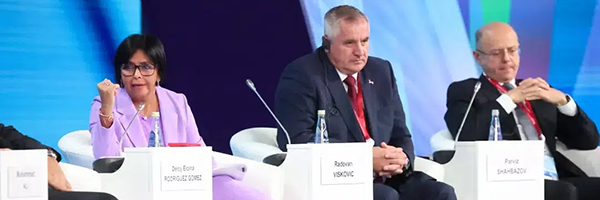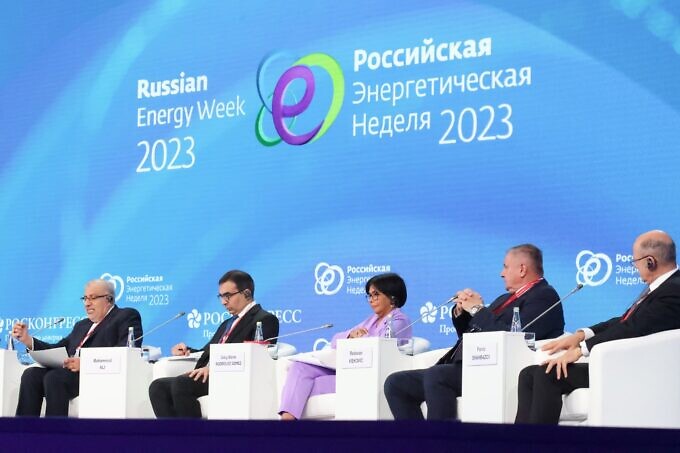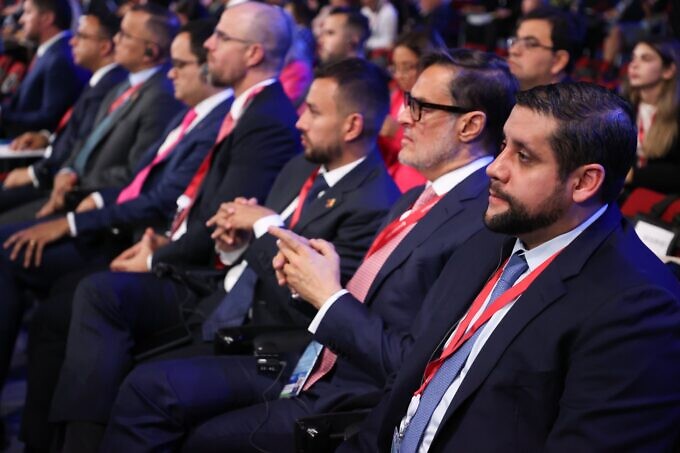VP Rodríguez: Venezuela Lost Nearly 4 Billion Barrels of Oil Production in 5 Years Due to Sanctions
 Orinoco Tribune, October 13m 2023 —
Orinoco Tribune, October 13m 2023 —
At the Russian Energy Week 2023 summit in Moscow this week, Venezuelan Vice President Delcy Rodríguez said that unilateral coercive measures imposed by the US and its allies against major oil producing countries have caused the first global energy crisis of this century.
On Thursday, October 12, speaking on a panel at the forum, she said “it is a hard blow that has been dealt to the global energy market and has caused the first global energy crisis of this century.” The panel in which she participated featured Alexander Novak, deputy prime minister of the Russian Federation; and Iranian Oil Minister Javad Owji.

Rodríguez traveled to Russia as the head of a high-level Venezuelan delegation to make new advances in bilateral relations. She participated in the Russian Energy Week summit, which is being held in Moscow during October 11-13.
“There are currently 930 illicit and illegal sanctions against Venezuela,” Rodríguez said.
“The impact that these sanctions have had on the Venezuelan economy is brutal,” she explained. “In five years, Venezuela lost oil production of 3.995 million barrels, a barbaric figure that represents $232 billion. If one takes into account what that could have contributed to the Venezuelan Gross Domestic Product during that period, the loss was $642 billion.”
“These are tremendous, terrible numbers, which have undoubtedly impacted Venezuela,” reiterated Rodríguez. She also underlined that other Caribbean nations were also harmed due to these sanctions, such as Haiti, “where Venezuelan cooperation reached $4 billion in four years, but today Haiti is a failed state.”

She highlighted that her country, with its own efforts since 2021, is trying to recover its economy, despite the fact that “in five years Venezuela lost the production of 3.995 million barrels of oil”.
She also pointed out that the countries sanctioned by the United States and its satellites have a common feature; they have oil. “There are 31 countries in the world that are sanctioned by the US, but the geostrategic objective is to target the oil exporting countries and the idea is to hit the global energy markets.”
The focus of US foreign policy has been imposing sanctions and promoting war throughout the world. “It is a geostrategic objective [of the US], to ensure energy for its own needs and its own market,” Rodríguez said.

Damage to Europe
The Western sanctions imposed on Russia, the world’s largest gas producer and a global oil giant, have seriously harmed the countries of Central and Eastern Europe, the Venezuelan vice president noted. “For example, European citizens have to pay much more expensive energy bills for heating, for electricity, for transportation,” she said.
“Today Europe pays 30% more expensive gas bills,” Rodríguez added, quoting Russian President Vladimir Putin. “What has happened in Europe is a clear consequence of the displacement of its main gas supplier, which was Russia.”
The impact of the war in Palestine
According to Rodríguez, the present military escalation in Palestine “is being used as an excuse” by the US, which sent to the area “the most powerful nuclear aircraft carrier in the world.”
“It could be the beginning of an escalation in a region that has the largest energy reserves on the planet,” she warned, and denounced Israel for carrying out a genocide against the Palestinian people. She added that the situation in Palestine is being taken advantage of to create an escalation in the global fuel prices.
De-dollarization as a solution to sanctions
For Rodríguez, one of the solutions to shield the world energy market from Western sanctions is to put an end to a situation in which “it is mainly traded in dollars… De-dollarization will allows us to take away from the US the absolute control of the international financial messaging systems, a complete hegemony over the banking systems, the main tool for hurting countries which are not aligned with its interests.”
She explained that the measure will allow oil and gas producing countries to move away from the US-controlled financial mechanism and start trading their energy resources in national currencies.
Cooperation through blocs like OPEC, OPEC+ and BRICS
The Venezuelan vice president also highlighted the importance of cooperation between oil and gas producing countries within organizations such as OPEC and OPEC+, in order to confront the “central axis of US foreign policy,” the sanctions. “We can develop common policies, not only for ourselves, but for the balance of the world energy market,” she pointed out.
In the same vein, she advocated for efforts within the growing BRICS group, which “today has 43% of the planet’s energy reserve, but has also become a space for meeting and dialogue among the world’s principal producers and consumers.”
